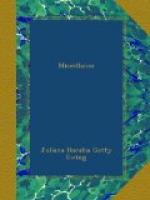“The Turks bury their dead as we do, my dear Maggie, and they plant their graveyards with cypresses, which, standing tall and dark among the headstones of the graves, have a very picturesque effect. The cemetery in all Turkish towns is a favourite place of public resort, but I cannot say that it is kept in very nice order, as a rule. For the sake of a water-colour sketch I made in one, I was very glad that the upright headstones were tumbling about in all directions, it took away the look of stiffness and monotony; but I am bound to say that the graves looked neglected as well as picturesque. The cemetery at Pera had too much refuse, and too many cocks, hens, and dogs in it. It looked very pretty, however, from my windows, sloping down towards the Golden Horn, beyond which I could catch a glimpse of Stamboul on the heights across the water. But I have not yet told you what Constantinople looked like when I first saw it.”
“You began about the Sea of Marmora, Cousin, and here it is. I’ve had my middle finger on it ever since we found it, to keep the place.”
“Very good, Maggie. We were coming up the Sea of Marmora one evening, and drew near to Constantinople about sunrise. I knew we were near, but I could not see anything, because a thick white mist hung in front of us like a veil resting on the sea. We were near the mouth of the Bosphorus when the sun broke out, the white mist rose slowly, like the curtain of a theatre, and—more beautiful than any scene that human hands can ever paint—I saw the Queen of Cities glittering in the sunshine.”
“What made it glitter? Are the houses built of shiny stuff?”
“The houses are built of wood, but they are painted in many colours. The rounded domes of the mosques are white, and the minarets, tall, slender, and fretted, are white, with golden tops, or white and blue. I can give you no idea how beautifully the shapes of the mosques and minarets break the uniformity of the mass of houses, nor how the gay colours, the white and the gold, shone like gems against a cloudless blue sky when the mist rose. No princess in an Eastern fairy-tale ever dazzled and delighted the beholder by lifting her veil and displaying her beauty and her jewels more than my eyes were charmed when the veil was lifted from Constantinople, and I saw her lovely and sparkling in the sun.”
“Are the streets very beautiful when you get into them?”
“Ah, Fred, I am sorry to say—no. They are very dirty, and very narrow. But they are picturesque, and made doubly so by the fact that in them you meet people of all nations, in every kind of dress, gay with all colours of the rainbow.”
“Are there shops in the streets?”
“Most of the shops are all together in certain streets by themselves, forming what is called a Bazaar. But in the other streets there are a few, such as sweetmeat shops and coffee shops, where the old Turks go to drink thick black coffee, and smoke, and hear the news; and (if they wish it) to be shaved.”




